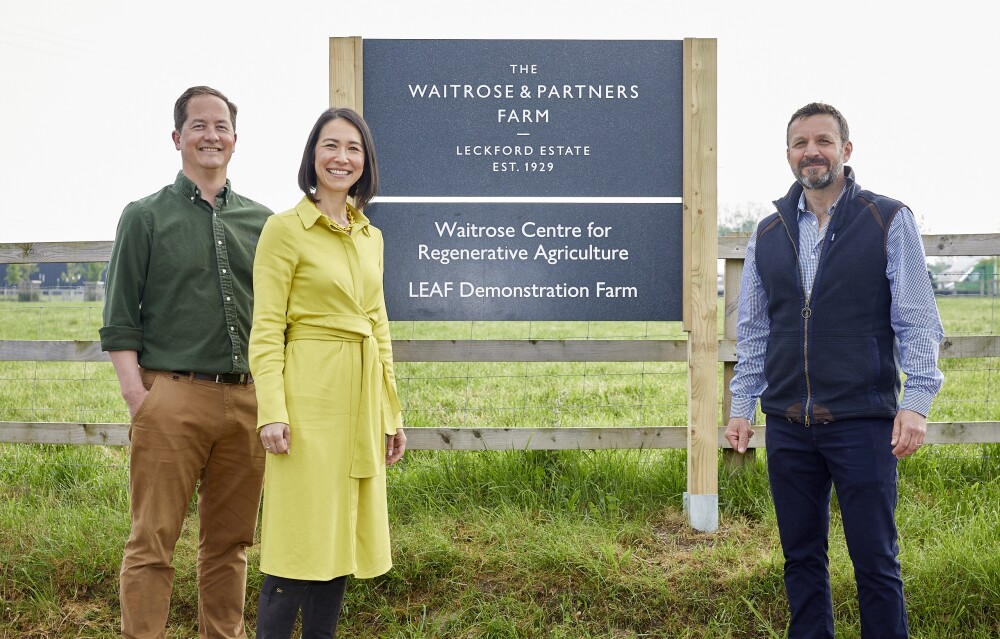In 2024 Waitrose unveiled its pioneering ‘Farming for Nature’ initiative which committed to support more than 2000 of its British farmers to move to nature-friendly farming practices, helping to boost financial resilience of farms in the long-term and combat the effects of climate change.
Nearly a year on, Pollination Director Valerie Pinkerton spoke to Andrew Hoad, Head of Leckford, The Waitrose Farm and Business Lead for Farming for Nature at Waitrose about the initiative and its progress to date.
Valerie Pinkerton (VP): Can you explain what “nature-friendly farming” means to Waitrose?
Andrew Hoad (AH): An integrated farming system that helps nature thrive and where nature actively contributes to the production of healthy, high quality, nutritious food
VP: What motivated Waitrose to adopt nature-friendly farming practices?
AH: Our programme is predominantly focused on UK agriculture. We need to evolve to a farming system that is both resilient to weather extremes and enables nature to recover from its currently depleted state. As a point in case the UK harvest was down around 25% on average levels in 2024 primarily due to a very wet winter and low sunshine hours during Spring. A farming system which regenerates soils and works with nature to tackle issues of pests and disease will provide a more effective buffer from effects of climatic change and the effects of nature loss. This has the potential to reduce the reliance on synthetic inputs over time which can be both beneficial commercially and environmentally.
VP: What specific practices are involved in Waitrose’s nature-friendly farming approach?
AH: We are following the six key principles of regenerative agriculture. These are broadly recognised as:
Understanding farm context, minimising soil disturbance, maximising plant diversity, living root all year round, keeping soil covered and integrating livestock where it is possible.
Aligned to this is ensuring that the farm ecosystem is functioning well and enabling nature to thrive as part of the whole farm.
VP: How does Waitrose ensure that its farming partners adhere to these nature-friendly practices and how are you measuring the environmental benefits of implementing them?
AH: We are at the start of a 10 year transition to regenerative agriculture as part of our commitment to Net Zero farming by 2035. We are currently working with a small group of satellite farmers to design practices that are adoptable within specific supply chains which recognises the unique characteristics of different sectors. Once we are confident that these are effective we will scale across supply chains, as part of this we will measure and report on uptake and also design and report on key outcome metrics around soil, water, biodiversity and carbon.
We have also embarked on the roll out of Land App across our own label supply chain to enable us to accurately base line the current state of nature across our farms and to help farmers develop land management plans.
VP: How does nature-friendly farming impact biodiversity on and around Waitrose farms?
AH: We will measure impact over time but all of the regenerative farming practices aim to increase biodiversity -below and above ground – through reduced disturbance, supporting ecosystem recovery and drawing on nature to reduce the reliance on synthetic inputs. Examples would be field margins providing habitats for friendly insects reducing the need for pesticide use, use of multi species leys to support wider functioning ecosystems, minimising mechanical and chemical soil disturbance enabling soil function to build organic matter and soil health building soil fertility.
VP: How have the farmers and local communities responded to Waitrose’s nature-friendly farming initiatives?
AH: Our Waitrose farmers are a strong group with a good track record in high welfare sustainable farming practices so are generally supportive of the ambition. A number of our farmers have already made the decision to adopt regenerative practices and they are positive about the recognition and additional support that Waitrose is providing. For any farmer that is yet to start we know the thought of transition could be daunting. Our programme has been designed to enable farmers to build confidence through specific guidance on practices and learning from other farmers. Our work with our satellite farmers will help ensure that the guidance we provide will be directly relevant to the farming sector they operate in which is another important factor in building confidence and removing barriers that may exist.
VP: What kind of support does Waitrose provide to farmers to help them transition to and maintain nature-friendly farming practices?
AH: Our programme is split into three key areas: technical support, measurement and transition support.
